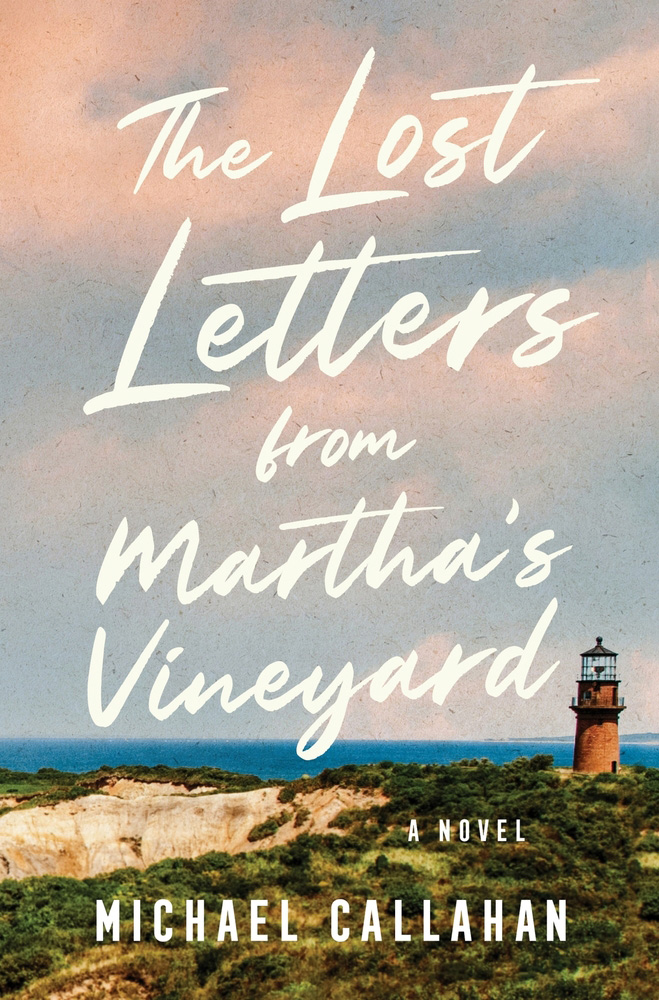The Lost Letters from Martha’s Vineyard by Michael Callahan, Mariner Books 2024, 304 pages, $30.
Michael Callahan’s new novel The Lost Letters from Martha’s Vineyard opens in 2018 and introduces Kit O’Neill, a junior producer on a failing Manhattan TV show, who’s trying to put a brave face on the enormous tragedy that’s struck her life: her beloved grandmother Nan has died.
Nan had been much more than a grandmother. She’d stepped into the role of Kit’s mother and been the one who “braided her hair and hugged away the tears and clapped from the third row at the school pageants.”
And even now, after Kit has returned to work and normal life, the grief still periodically overcomes her. “It’s when she’s caught off guard — an old song piped into a restaurant, a rediscovered birthday card saved in a shoebox — that she finds herself emotionally assassinated,” we’re told.
The whole ordeal has left Kit adrift, wondering “How do you describe the person who, in the wake of unspeakable loss, stepped in and gave you your life?”
But there are obligations Kit can’t evade, and one of those is to help her sister Claire sort and pack all the stuff in her grandmother’s home. Her sister is very comforting but the process is a combination of tedious and sentimental until Kit finds a batch of memorabilia that includes an old playbill from the Martha’s Vineyard Players, dated 1959 and dealing with a play called The Rose of Aquinnah.
Staring out from that old faded playbill is the face of Kit’s grandmother.
Her grandmother’s name was Edith, but the woman on the playbill is Mercy Welles, a long-lost actress who once seemed destined for stardom and then abruptly and mysteriously walked away from Hollywood. Kit is stunned. Her grandmother had never even mentioned Martha’s Vineyard.
Mr. Callahan splits his narrative between Kit’s ongoing discovery of her grandmother’s real identity and the story of Mercy Welles, a beautiful Midwestern girl who wants to succeed in the rampantly sexist Hollywood of the 1950s. She encounters this sexism first-hand when a screenwriter attempts to introduce her to the stereotypical casting couch. He gets a sharp kick, she keeps her dignity, but the illusion of her dream is shattered by these kinds of incidents.
Meanwhile, in the casting of The Rose of Aquinnah on the Vineyard, she finds the last thing she was expecting: genuine love. She visits a lovely secluded Vineyard cove with Ren Sewards, scion of the “legendary but cryptic” first family of Martha’s Vineyard. When she falls off their little catboat and panics because she can’t swim, Ren is right there, saving her and calmly telling her, “Always be brave.”
But the Sewards family has deep secrets that are zealously guarded by Ren’s imperious, interfering mother Mint who clearly doesn’t want Mercy growing intimate with her son. She’s hoping that as soon as The Rose of Aquinnah closes, Mercy will be heading back to Hollywood.
In an attempt to figure out how all those old events played out and to learn the truth about the grandmother she thought she knew, Kit eventually summons the courage to go to the heart of the story: Martha’s Vineyard.
She visits the Martha’s Vineyard Historical Society in Edgartown and quite sensibly consults old editions of the Vineyard Gazette to learn what she can about the Sewards family and The Rose of Aquinnah.
Mr. Callahan shifts expertly between the two timelines of his story, playing off the tensions of each against the other in the best tradition of this kind of dual-timeline novel. Each of the dramatic developments from 1959 twist and transmute into revelations in 2018, and half the fun is learning the deeper significance of things that first seemed trivial (including “Always Be Brave”).
Mr. Callahan works in a good deal of Vineyard history, wonderfully informed asides about the movie and theatre industries, a murder mystery and even a pair of parallel romance plots. There’s something for every reader here (particularly Vineyard readers, of course), with a bright humanistic light running through it all.







Comments
Comment policy »